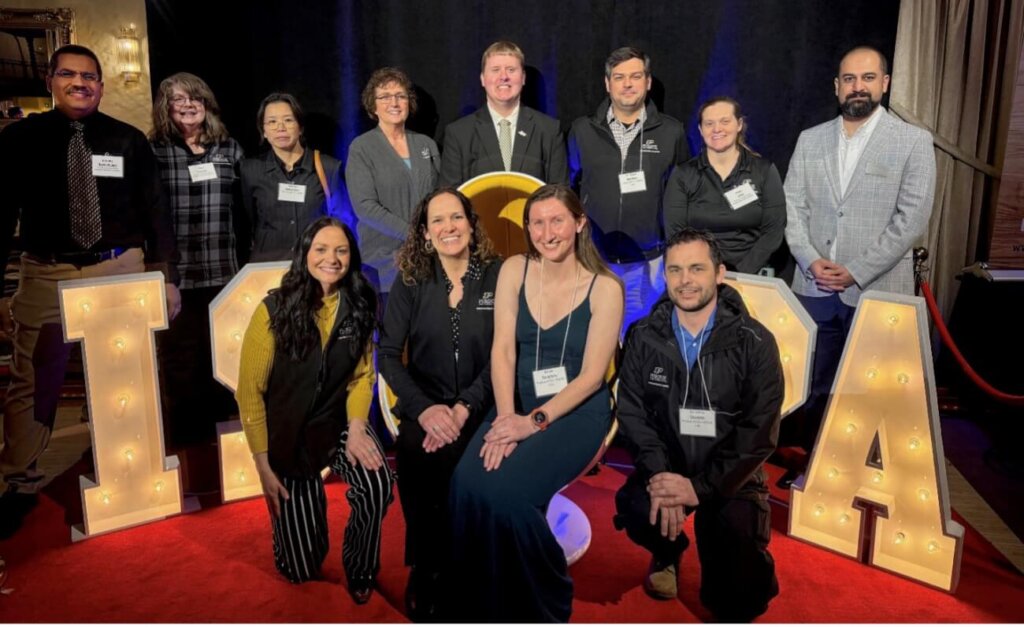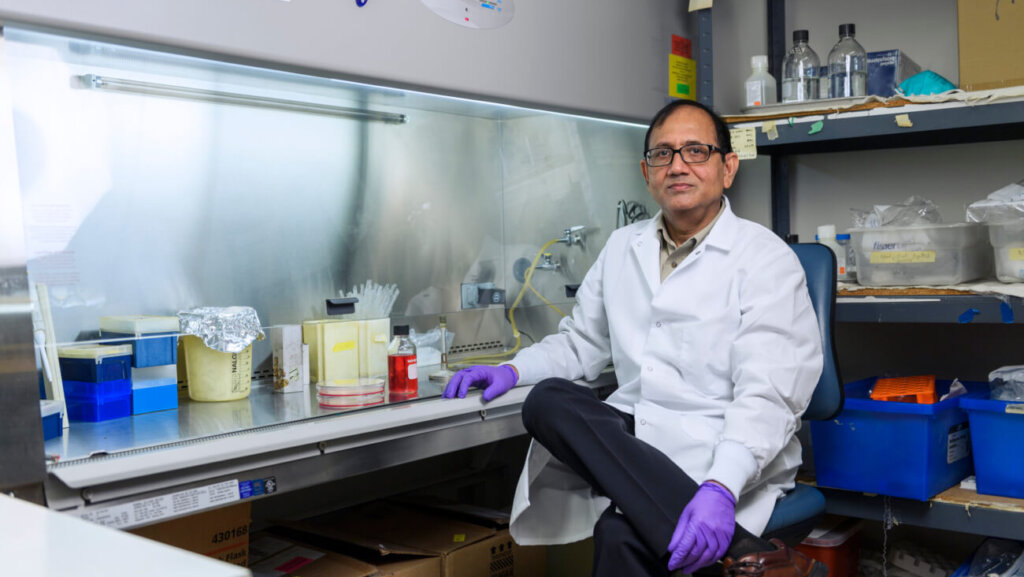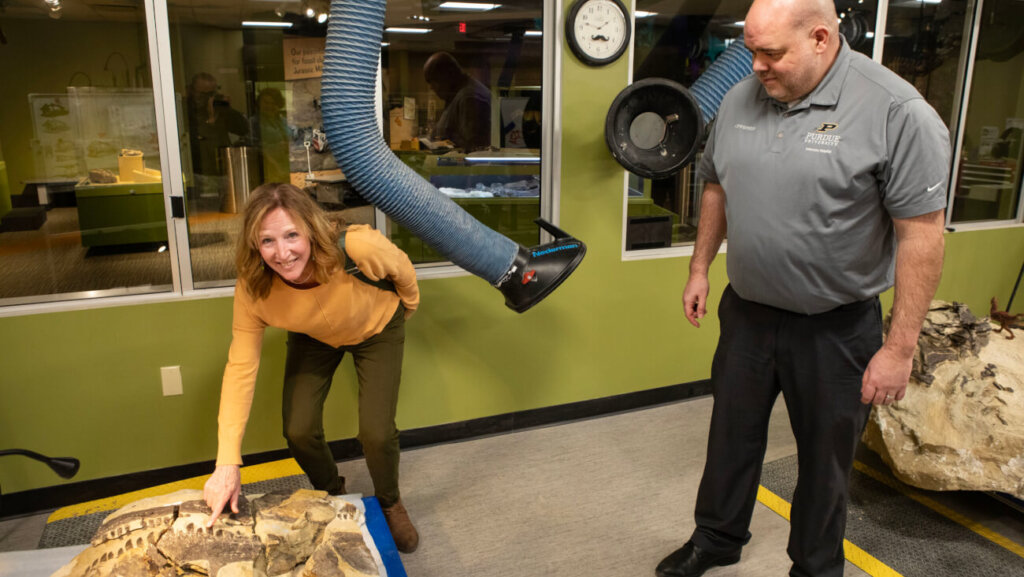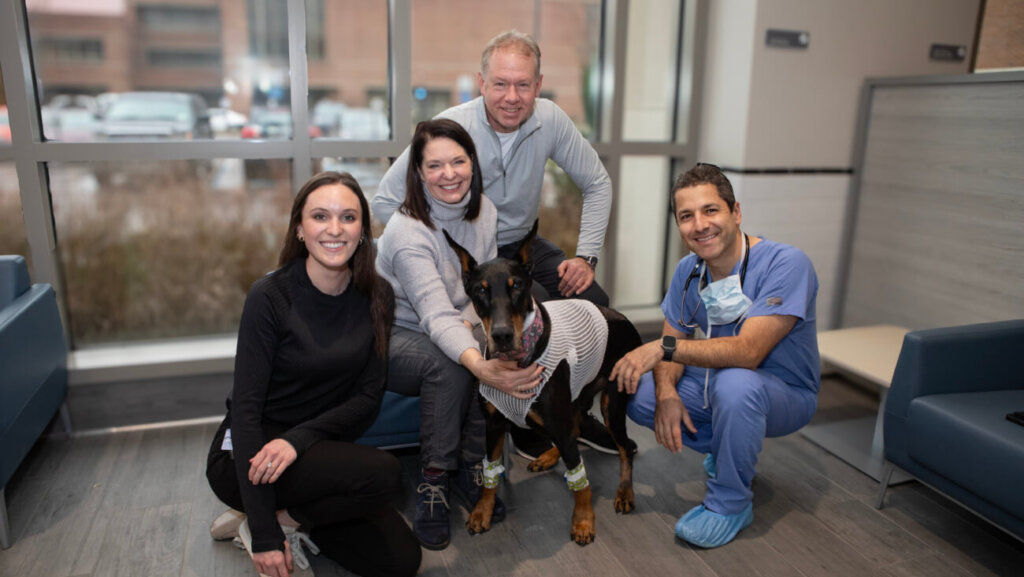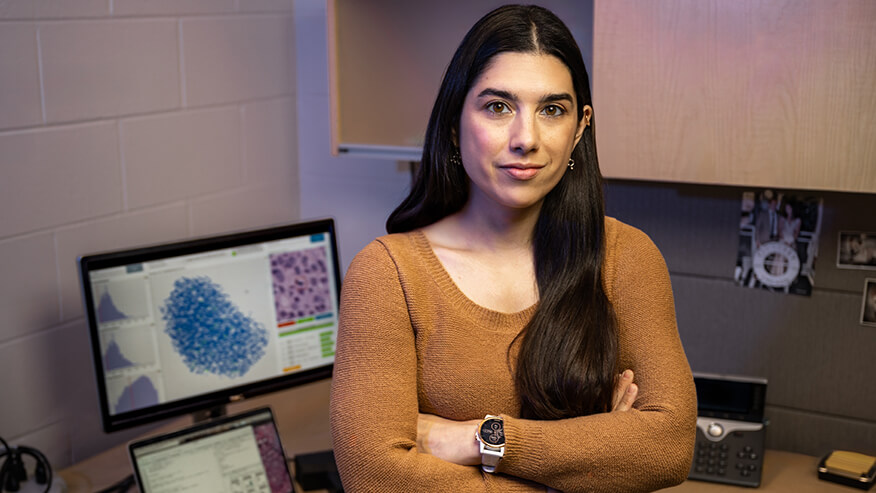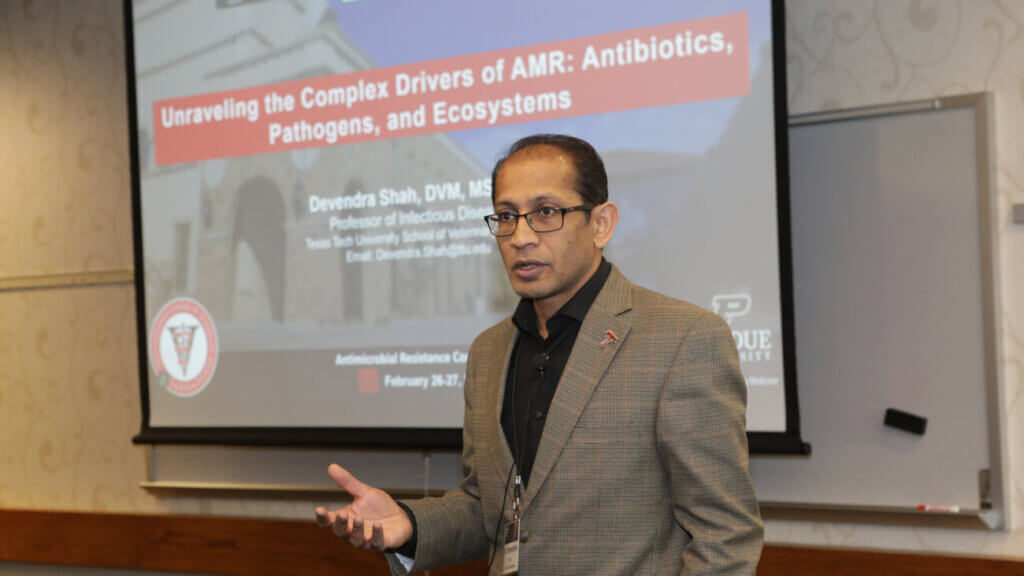Research
Elegant Evening in Indianapolis Spotlights ADDL’s Importance to Poultry Industry
February 13, 2026
It’s called “An Evening Under the Stars with the Indiana State Poultry Association” because the yearly event is a celebration of the poultry industry that’s held in downtown Indianapolis at the iconic Indiana Roof Ballroom. Purdue Veterinary Medicine was a Silver sponsor for this year’s January 20 event, which attracted a record turnout and provided an important opportunity for Indiana Animal Disease Diagnostic Laboratory (ADDL) representatives to showcase ADDL services and the laboratory’s important role in supporting the state’s poultry industry.
Purdue Veterinary Medicine Contributes to Purdue’s Top Seven National Ranking for U.S. Patents Received
February 13, 2026
An innovation to detect heart rate, respiration and oxygen saturation. An adenoviral vector system for gene delivery. A protein-based adhesive. These are among the 172 innovations created by Purdue University researchers for which the Purdue Research Foundation (PRF) received patents in the 2025 calendar year from the U.S. Patent and Trademark Office, reflecting Purdue’s status as a global leader in protecting and promoting intellectual property.
PVM’s Upcoming Coppoc One Health Lecture to Focus on Dogs as Sentinels of Environmental Exposure
February 6, 2026
The Purdue University College of Veterinary Medicine brings a leading One Health scholar to campus each year to address vital health issues from a One Health perspective as part of the Coppoc One Health Lecture series. This year’s presentation, scheduled for February 26 in Lynn Hall Room 2026, is on the engaging topic, “One Health at Home: Dogs as Sentinels of Environmental Exposure.” The speaker will be Audrey Ruple, DVM, MS, PhD, DACVPM, MRCVS, the Dorothy A. and Richard G. Metcalf Professor of Veterinary Medical Informatics at the Virginia-Maryland College of Veterinary Medicine at Virginia Tech.
History in the Making: Purdue Veterinary Medicine Connects 21st Century Diagnostic Imaging with Prehistoric Dinosaur Remnants in Partnership with Children’s Museum of Indianapolis
January 22, 2026
If you haven’t heard of an Allosaurus before, expect the name of this Jurassic-era predator to become much more familiar in the years to come, as a planned future exhibit at the acclaimed Children’s Museum of Indianapolis takes shape, with some help that was provided by the Purdue University College of Veterinary Medicine. That help enabled the museum’s paleontology team to obtain needed high tech CT (computed tomography) scans of a prehistoric fossil courtesy of the Purdue University Veterinary Hospital’s Diagnostic Imaging team.
PVM Scholars Co-Edit New Edition of Signature Veterinary Histology Textbook
January 22, 2026
A new edition of a time-tested and influential veterinary work is on the market thanks to the scholarly efforts of two Purdue Veterinary Medicine faculty members and their team of U.S. and international experts from multiple veterinary schools. “Dellmann’s Textbook of Veterinary Histology” is an essential resource connecting the microscopic world of cells and tissues to the broader understanding of anatomy and physiology in domestic animals. Co-edited by Drs. Marxa Figueiredo and John Turek, associate professor and professor emeritus, respectively, in the college’s Department of Basic Medical Sciences (BMS), this latest edition integrates high-resolution electron and color micrographs with updated content that reflects current scientific and clinical knowledge.
Electric Signals Help Immune Cells Find Their Way
January 22, 2026
The body’s immune system is constantly on patrol, deploying billions of specialized cells to detect and destroy harmful invaders. Among the first to respond are neutrophils — fast-moving white blood cells that rush to sites of infection or injury. But how do these tiny first responders know where to go? A new study led by Purdue University researchers reveals that electrical signals across a cell’s membrane — a form of bioelectricity — play a critical role in how immune cells navigate.
An Alumna’s Giant Leap of Faith
January 22, 2026
Argo the Doberman was in trouble. Diagnosed with ventricular arrhythmia, an abnormal heart rhythm, he could collapse and die at any moment. Although a local specialty clinic had stabilized him, his owner, Dr. Laura Strong (PU DVM ’87), knew that traditional medication wouldn’t be enough. In her search to give Argo a chance to live a longer life, Dr. Strong returned to her alma mater, the Purdue University College of Veterinary Medicine, which is pioneering a cardiac procedure for dogs.
How the Brain Recognizes What It’s Seen Before and Why It Matters for Autism Research
January 16, 2026
When you walk into a familiar place — your kitchen, a classroom, or your neighborhood — your brain instantly starts matching what you see with memories of past experiences. A new study from Purdue University reveals a key piece of how that recognition process works, and why it may be disrupted in conditions such as Fragile X syndrome, a leading inherited cause of autism.
Purdue Veterinary Medicine Computational Biologist Uses Big Data, AI and Math to Find Patterns in Cancer
December 5, 2025
With recent advances, cancer research now generates vast amounts of information. The data could help researchers detect patterns in cancer cells and stop their growth, but the sheer volume is just too much for the human mind to digest. Enter Nadia Lanman, research associate professor in the Department of Comparative Pathobiology, whose expertise in computational biology helps researchers at Purdue University distill solutions from the sea of numbers.
Purdue to Host Fourth Annual Antimicrobial Conference in February
December 5, 2025
With leadership by the Purdue University College of Veterinary Medicine, the Fourth Annual Conference on Antimicrobial Resistance (AMR) will be held at Purdue University West Lafayette February 25–26, 2026. With multidrug-resistant infections on the rise globally, this event brings together experts and practitioners across the spectrum of human, animal, and environmental health to address one of today’s most urgent public health challenges.

